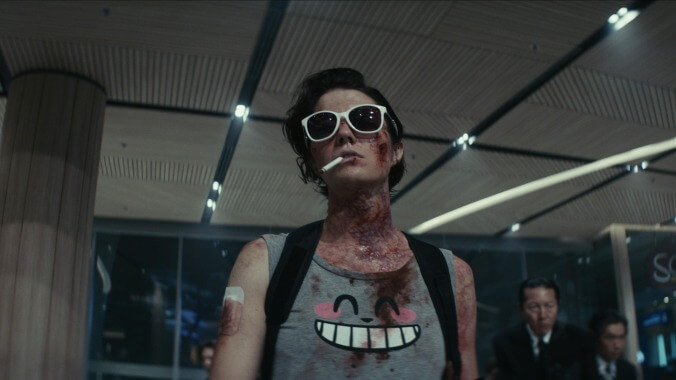Another elite assassin, another rampage—haven’t we seen Netflix’s Kate before?
Enough already with the John Wick duplicates, there’s only so much we can take

This declaration probably could’ve been made a couple movies ago, but congratulations are in order for John Wick on having attained the Die Hard status of infinite remake-ability. Just as a generation of action releases sold the public variations on the same idea under the hook of “it’s Die Hard on a _____,” Hollywood has apparently given an open green light to projects tweaking the winning formula of “elite assassin with one thing to care about in this cruel world goes on rampage of vengeance.” This doesn’t have to be a bad thing, as the recent Bob Odenkirk vehicle Nobody proved, refreshing the concept by sticking a mild-mannered everyman in the killing-machine role. That film enjoyed some added credibility by having John Wick co-director David Leitch on as producer, as does Netflix’s Kate, the latest in this lineage of smoking barrels and ice-cold quips. Regrettably, the umpteenth neon-laced bullet ballet lands much closer to rip-off than riff.
Mary Elizabeth Winstead leads the way this time around as Kate, a hardened gun-for-hire raised from girlhood to stuff down her feelings so she can focus on marksmanship and hand-to-hand combat. (Same deal as Karen Gillan in this past July’s Gunpowder Milkshake.) She trusts no one but her handler and adoptive father figure, played by a present-at-best Woody Harrelson. (Same deal as Paul Giamatti in Gunpowder Milkshake, down to the eventual reveal of his intentions.) The wrinkle in this iteration of the increasingly worn narrative is that Kate’s been dosed with poison she’ll succumb to in 24 hours’ time, meaning the murder she’s avenging is… her own. (Same-ish deal as Gunpowder Milkshake, though in that one, Gillan’s character was only jabbed with a paralyzing serum. It wore off after about half an hour, much like this movie.)
The real distinguishing factor brought to the table by Cedric Nicolas-Troyan—a career VFX specialist who’s directed only one other feature, The Huntsman: Winter’s War—is the Japanese setting and his fraught engagement with it. Kate picks off a yakuza boss in a prologue and orphans his young daughter, Ani (Miku Patricia Martineau), who will of course become the gratingly plucky sidekick once she reappears during Kate’s next assignment in Tokyo years later. (This exact thing also happens in Gunpowder Milkshake, even the oblivious younger girl learning of their true connection at the very same point in the second act!) It’s then that the clock starts ticking on their lives, the women both targeted by gangsters looking to clean house. Their initial unease with one another soon gives way to a surrogate parent-child bond with a basic girl-power flavor, Ani admiring Kate for being a “badass” and “total killer babe.”
Audiences have fair cause to look askance at a racial dynamic that sees a white woman mowing down wave after wave of faceless Asian enemies, and the script makes a feeble attempt to get out in front of this with occasional cracks about the dumb gaijin. But Ani’s significant confession that she feels like a pariah due to her half-white parentage once again centers the perspective of Kate and people who can see themselves in her outsider identity. Speaking of which, the similarly yakuza-heavy Jared Leto netflick The Outsider mirrors a lot of the borderline-insulting genuflections to Japanese culture littering Kate. Whether it’s the pit stop at a J-pop concert, a quick kabuki interlude, a running gag about exotic soda flavors, phrases like “most regrettable,” or the chibi-style anime T-shirt Kate wears for most of her last day, Nicolas-Troyan’s fascination never delves deeper than the broad novelty sought out by a tourist.
It’s not a good sign that almost everything in the film seems to have come from somewhere else, most pronounced in a fight scene that recycles a refrigerator-door move from Leitch’s own Atomic Blonde. Even if the combat choreography that made this vein of cinema so popular is up to snuff, and Winstead does handle her steps ably even as her character breaks down, this film should aspire to be more than a delivery system for a few solid shootouts. The space between the set pieces meant to draw crowds can be filled with cleverness and heart as easily as nothing. The lessened oversight of fly-by-night genre productions has afforded driven filmmakers a chance to show their stuff and try some things out. Or it used to; in our new era of algorithmically dictated content, computers can make all those pesky creative decisions in record time. The downside appears to be that this method results in a shameless sameness, tepid gruel served again and again. And again. And again. And again.